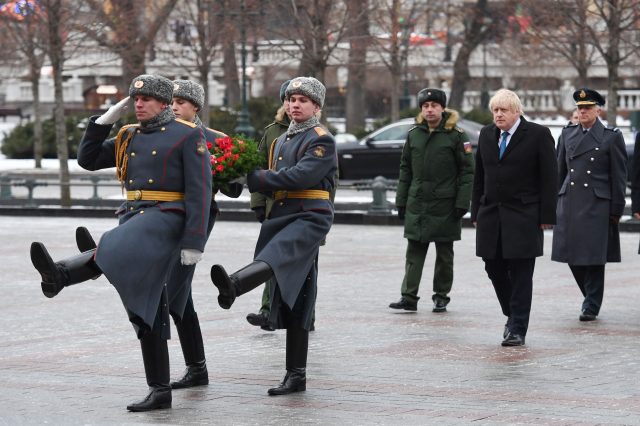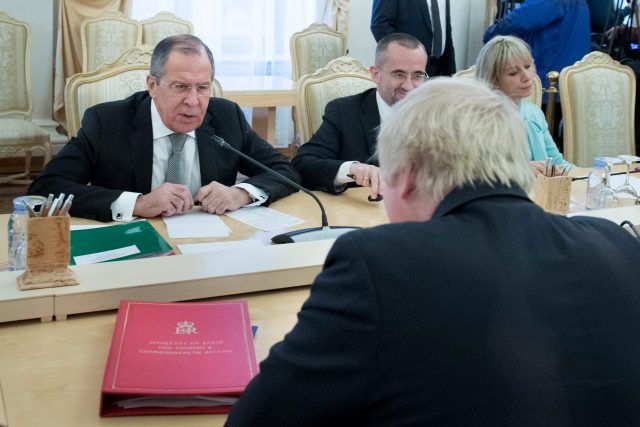Boris Johnson has clashed publicly with his Russian counterpart over Crimea and Moscow’s alleged cyber attacks on the West, as the two men met in Moscow.
Sergey Lavrov denied claims the Kremlin had interfered in democratic elections online and accused Mr Johnson of being a “hostage” of untrue Western narratives on the issue.
But in a series of extraordinarily frank exchanges, Mr Johnson insisted there was “abundant evidence” of Russian interference in polls in the US, Germany, Denmark and France.
When the Russian foreign minister told a press conference in Moscow that Mr Johnson himself had confirmed Russia had not interfered in the UK’s election and Brexit referendum, the Foreign Secretary interrupted to add: “Not successfully.”
The clash came after Mr Johnson issued a warning to the Kremlin that Britain was “prepared and able” to respond in kind to cyber attacks.
Speaking after more than an hour of talks on the first visit to Russia by a British foreign secretary for five years, both men acknowledged that relations between the two countries were at their worst for many years.
Frank talks w/ Russian foreign minister Lavrov in Moscow. We recognised many significant differences but agreed shared interests & global duties require dialogue. Talks covered UN security council priorities inc Iran/Syria/DPRK & bilateral relations pic.twitter.com/LkVRBwiaBa
— Boris Johnson (@BorisJohnson) December 22, 2017
Nevertheless they accepted their countries had a duty to work together as fellow permanent members of the UN Security Council on issues affecting global security like Syria, Iran and North Korea.
The two men insisted they had established a level of personal trust, with Mr Johnson joking that he had even handed his coat with “everything in my pockets, secret or otherwise” to Mr Lavrov when he arrived at the Ministry of Foreign Affairs building.
Mr Lavrov joked back: “I can say that there was nothing in the pockets of Boris’s coat,” to which Mr Johnson responded in surprise: “So you have searched it already?”
Honoured to pay my respects at Tomb of the Unknown Soldier at the Kremlin Wall, Moscow, recognising Russia's military sacrifice in the Second World War pic.twitter.com/iX6p1gB852
— Boris Johnson (@BorisJohnson) December 22, 2017
However, when Mr Johnson rejected Mr Lavrov’s denial that Russia had attempted to interfere in British polls, the Russian foreign minister retorted: “He is afraid if he doesn’t contradict me his reputation is going to be ruined.”
Mr Johnson said Russian attempts to interfere in Britain’s referendums and elections “whatever they might be” had not been successful, adding that if they had, “that would have been an entirely different matter”.
Mr Lavrov said the evidence produced so far of Russian attempts at interference amounted to no more than the spending of “a few kopecks” on social media adverts.
 Mr Johnson during a wreath-laying ceremony at the Tomb of the Unknown Soldier (Stefan Rousseau/PA)
Mr Johnson during a wreath-laying ceremony at the Tomb of the Unknown Soldier (Stefan Rousseau/PA)
“I think you have made all this up in your Western community and unfortunately right now you are hostage to this subject, it is very difficult for you to climb down from the fence you have climbed.”
He criticised Britain for cutting off ties with the FSB security agency over the murder of Alexander Litvinenko in London, complaining that UK authorities had refused to hand over information in the case.
He said the takeover of Crimea had been approved by a referendum of its citizens unlike the break-up of the former Yugoslavia
 Sergei Lavrov during talks with Boris Johnson (Stefan Rousseau/PA)
Sergei Lavrov during talks with Boris Johnson (Stefan Rousseau/PA)
And he said that UK Government criticism of politicians who speak to Russian media outlets like the RT TV channel did not reflect well on the UK.
“We are concerned that the cradle of democracy, the United Kingdom, sees the vilifying of people for speaking to Russian media,” he said. “It doesn’t add to the good reputation of the Government, unfortunately.”
.@BorisJohnson's visit to Moscow is the first by UK Foreign Secretary in nearly six years.
There are significant differences between the views of Britain and Russia but we must look for ways to work together to solve the world's most pressing challenges pic.twitter.com/GGpbfO7NdV— Foreign Office ???????? (@foreignoffice) December 21, 2017
Earlier Mr Johnson was rebuked by his host for speaking in public about their differences. On the eve of the talks, Mr Johnson sent a blunt message to the Kremlin to stop its use of cyberspace to disrupt Western countries.
He told reporters: “The UK is certainly prepared and able to respond, should we so desire.”
Facing Mr Johnson across a conference table at the Ministry of Foreign Affairs Guest House in Moscow, Mr Lavrov said: “It is no secret that right now our relations are at a low point.
“You prefer to talk about these reasons publicly, whereas we would prefer to talk about our mutual concerns not before a mike and at a tribune, but directly.”
In a move likely to further aggravate his Russian hosts, Mr Johnson later laid a bunch of red roses at the spot on Bolshoy Moskvoretsky Bridge where opposition leader Boris Nemtsov was assassinated in 2015.







Why are you making commenting on The Herald only available to subscribers?
It should have been a safe space for informed debate, somewhere for readers to discuss issues around the biggest stories of the day, but all too often the below the line comments on most websites have become bogged down by off-topic discussions and abuse.
heraldscotland.com is tackling this problem by allowing only subscribers to comment.
We are doing this to improve the experience for our loyal readers and we believe it will reduce the ability of trolls and troublemakers, who occasionally find their way onto our site, to abuse our journalists and readers. We also hope it will help the comments section fulfil its promise as a part of Scotland's conversation with itself.
We are lucky at The Herald. We are read by an informed, educated readership who can add their knowledge and insights to our stories.
That is invaluable.
We are making the subscriber-only change to support our valued readers, who tell us they don't want the site cluttered up with irrelevant comments, untruths and abuse.
In the past, the journalist’s job was to collect and distribute information to the audience. Technology means that readers can shape a discussion. We look forward to hearing from you on heraldscotland.com
Comments & Moderation
Readers’ comments: You are personally liable for the content of any comments you upload to this website, so please act responsibly. We do not pre-moderate or monitor readers’ comments appearing on our websites, but we do post-moderate in response to complaints we receive or otherwise when a potential problem comes to our attention. You can make a complaint by using the ‘report this post’ link . We may then apply our discretion under the user terms to amend or delete comments.
Post moderation is undertaken full-time 9am-6pm on weekdays, and on a part-time basis outwith those hours.
Read the rules hereLast Updated:
Report this comment Cancel